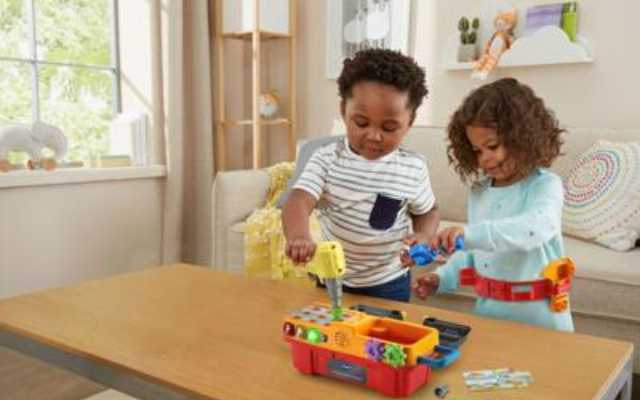Great ways to encourage imagination during playtime

Playtime is an essential part of childhood development, and it plays a significant role in shaping a child’s imagination. Imagination helps children to explore, learn, and create, and it’s essential to foster creativity and critical thinking skills. In this article, we will explore some of the great ways to encourage imagination during playtime.
Ways to encourage imagination during playtime
Provide Open-Ended Toys
Open-ended toys are great for sparking children’s imaginations as they allow them to use their creativity to play in a variety of ways. Examples of open-ended toys include blocks, Legos, play dough, and art supplies. These toys allow children to explore and experiment with different ideas and concepts, which in turn, helps them to develop problem-solving and critical thinking skills.
Encourage Pretend Play
Pretend play is an essential aspect of childhood development as it helps children to explore and make sense of the world around them. Encourage children to engage in pretend play by providing them with costumes, props, and other materials to help them bring their imaginative play to life. You can also participate in their pretend play, which will help to further develop their language and social skills.
Create a Reading Nook
Reading is a great way to encourage imagination, and creating a reading nook can help to make reading more appealing to children. Provide a comfortable and cozy space with pillows, blankets, and shelves filled with age-appropriate books. Encourage children to read on their own or with you, and allow them to choose the books they want to read.
Play Outside
Playing outside provides children with the opportunity to explore and use their imaginations in a natural setting. Outdoor play allows children to discover new things, experiment with different concepts, and develop their gross motor skills. Encourage outdoor play by providing them with age-appropriate outdoor toys, such as balls, hula hoops, and jump ropes.
Encourage Creative Writing
Creative writing is a great way to encourage imagination and develop language skills. Provide children with journals or notebooks, and encourage them to write stories, poems, or anything else that comes to mind. You can also suggest different writing prompts or themes to help spark their creativity.
Provide Sensory Experiences
Sensory experiences help children to develop their creativity and imagination by allowing them to explore different textures, smells, and tastes. Provide children with sensory experiences by offering them different materials, such as play dough, sand, or water. You can also encourage them to experiment with different smells and tastes, such as with baking or cooking activities.
Allow Unstructured Playtime
Unstructured playtime is important as it allows children to use their imaginations to create their playtime experiences. Provide children with unstructured playtime by allowing them to choose their activities and play at their own pace. Avoid overly structured activities or schedules as they can stifle children’s creativity and imagination.
- Epic Games Issues A Warning To ‘Fortnite’ PC Players As Season 2 Approaches
- 5 Best Strategy Games
- 15 Most Successful Video Games
FAQs:
Why is imagination important during playtime?
Imagination is essential during playtime as it helps children to develop their problem-solving and critical thinking skills. It also allows them to explore and make sense of the world around them, which is an essential aspect of childhood development.
What are some examples of open-ended toys?
Examples of open-ended toys include blocks, Legos, play dough, and art supplies. These toys allow children to use their creativity to play in a variety of ways, which helps to develop their imagination and problem-solving skills.
How can I encourage my child to engage in pretend play?
Encourage children to engage in pretend play by providing them with costumes, props, and other materials to help them bring their imaginative play to life. You can also participate in their pretend play, which will help to further develop their language and social skills.
Why is imaginative play important for child development?
Imaginative play helps children to develop important cognitive, social, and emotional skills. It allows them to explore their creativity, problem-solving abilities, and communication skills. Imaginative play also helps children to develop empathy, as they learn to understand and relate to others’ perspectives.
How can parents encourage imaginative play at home?
Parents can encourage imaginative play by providing open-ended toys and materials, creating a designated play space, and joining in on the fun. They can also encourage children to use their imaginations by asking open-ended questions and making suggestions that allow for creative exploration.
What are some examples of open-ended toys?
Open-ended toys are those that can be used in a variety of ways, rather than having a single, defined purpose. Examples of open-ended toys include blocks, dolls, balls, art supplies, dress-up clothes, and household items like cardboard boxes and blankets.
How does imaginative play promote social skills?
Imaginative play allows children to practice social skills such as communication, cooperation, and conflict resolution. They learn to share ideas, negotiate roles, and work together to create a story or scenario. This helps to build important social skills that will benefit them in other areas of their lives.
What are some other benefits of imaginative play?
In addition to cognitive and social development, imaginative play also promotes physical development as children engage in active play. It can also be a stress-reliever and help children to develop a sense of identity and self-confidence. Overall, imaginative play is an important aspect of childhood development that should be encouraged and supported.







